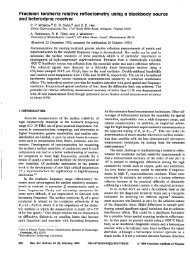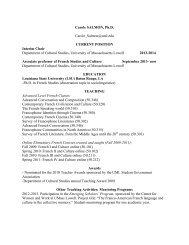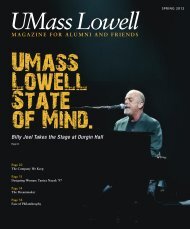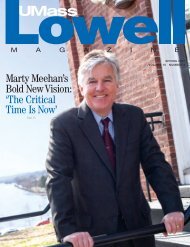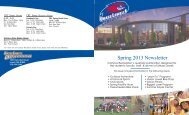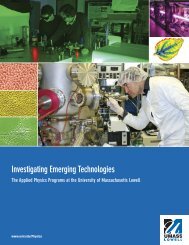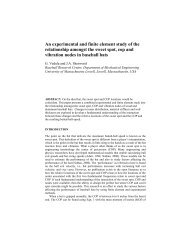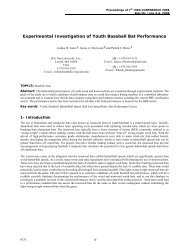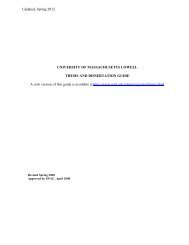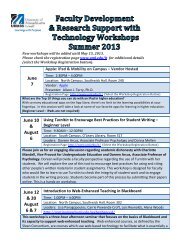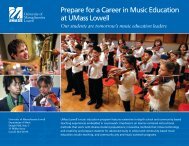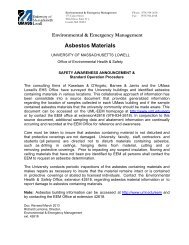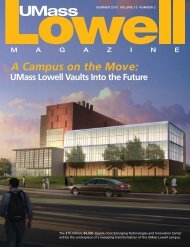comprehensive campus transportation plan - University of ...
comprehensive campus transportation plan - University of ...
comprehensive campus transportation plan - University of ...
Create successful ePaper yourself
Turn your PDF publications into a flip-book with our unique Google optimized e-Paper software.
<strong>University</strong> <strong>of</strong> Massachusetts Lowell Campus Transportation Plan<br />
I. Background <strong>of</strong> Transportation Plan<br />
The <strong>University</strong> <strong>of</strong> Massachusetts Lowell (UMass Lowell) is at an exciting<br />
milestone in its history. Enrollment has grown, the <strong>campus</strong> is expanding,<br />
state-<strong>of</strong>-the-art facilities are being <strong>plan</strong>ned and built, more student beds<br />
are coming on line on <strong>campus</strong>, and its host city, Lowell, is experiencing a<br />
vibrant revival with expanding downtown businesses and residences.<br />
With these changes come increased <strong>transportation</strong> demands, evidenced in<br />
busy streets and crowded parking lots, and there are exciting opportunities<br />
to satisfy these needs. In striving to create a livable <strong>campus</strong>, UMass Lowell<br />
is already embracing the challenge <strong>of</strong> environmental responsibility.<br />
Transportation plays a critical role in achieving sustainable goals, both<br />
environmentally and fiscally.<br />
Much has been accomplished already. The successful development <strong>of</strong> an<br />
efficient and flexible shuttle bus system since 2009 has helped knit together<br />
the geographically separated parts <strong>of</strong> the <strong>campus</strong>. The production <strong>of</strong><br />
pedestrian and bicycle maps has heightened people’s awareness <strong>of</strong><br />
alternative <strong>transportation</strong> opportunities, and the bike-share program,<br />
Freewheelers, implemented in Fall 2011, has been greeted with enthusiasm.<br />
The introduction <strong>of</strong> car-sharing (Zipcar Inc.), also in Fall 2011, is expected to<br />
reduce the need for residential students and commuters to bring a car to<br />
<strong>campus</strong>, and UMass Lowell’s participation in the state’s MassRides program<br />
facilitates ride-sharing opportunities for commuting faculty, staff and<br />
students.<br />
This Campus Transportation Plan has been developed to seize the moment<br />
and build upon the momentum <strong>of</strong> these recent accomplishments. The <strong>plan</strong><br />
lays out a trail-map to a more sustainable <strong>transportation</strong> system, one that<br />
will reduce greenhouse gas emissions and foster a more livable community<br />
for residents and commuters to the <strong>campus</strong> alike.<br />
A. An expanding Campus – the time is right for change<br />
UMass Lowell’s <strong>transportation</strong> needs are not static. In the five-year period<br />
from Fall 2005 to Fall 2010, enrollment increased by approximately 38<br />
percent, and future projections anticipate an additional 30 percent increase<br />
in enrollment by Fall 2015. Because <strong>of</strong> an historic dependence on auto<br />
commuting, there has been a simultaneous increase in parking demand,<br />
accommodated by surface parking lots that cover approximately 20 acres <strong>of</strong><br />
dedicated surface parking out <strong>of</strong> a <strong>campus</strong> total <strong>of</strong> 135 acres. With a large<br />
commuter population <strong>of</strong> faculty, staff and students, commuting to the<br />
<strong>campus</strong> is expected to increase, although it will be <strong>of</strong>f-set to some extent by<br />
expanding residential housing on <strong>campus</strong> for students.<br />
Vanasse Hangen Brustlin, Inc.<br />
1



